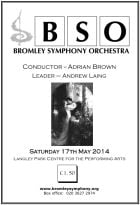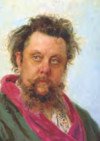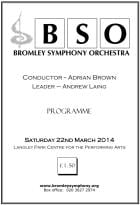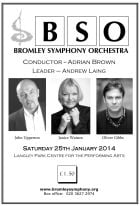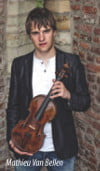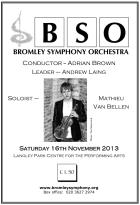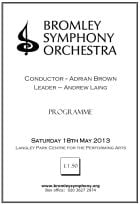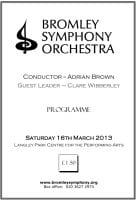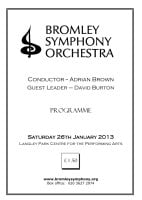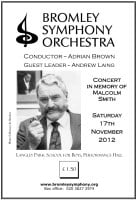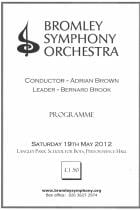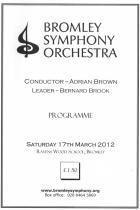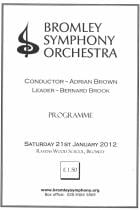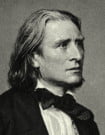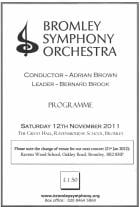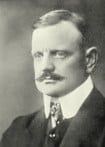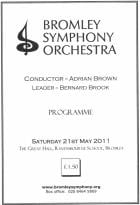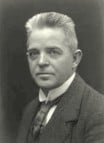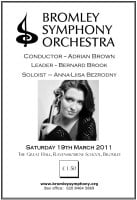These pages contain programmes and recordings of most of our recent performances. In addition, a list of every piece we have performed since 1960 is on the repertoire page and a history of the orchestra is on the about page.
Many of the sound recordings in this archive were recorded by students on the Tonmeister course at the University of Surrey, for which we are very grateful. Note that explicit approval is required for any photography or recordings, since we must have the consent of everyone involved and pay any extra fees incurred.
Click the programme covers to download the complete programme in PDF format. You can use a browser plugin such as Video & Audio Downloader to download audio and video recordings (start playing the recording to make it appear in the list).
Saturday 14th November 2015 at 19:45
Grieg Piano Concerto in A minor, Op. 16 Soloist Alexander Soares Tchaikovsky ‘Manfred’ Symphony in B minor, Op. 58 We open the season with two ‘takes’ on the romantic period pin-up, Manfred: Schumann’s broodingly magnificent ‘Manfred’ overture and Tchaikovsky’s rich and dramatic ‘Manfred’ symphony. In between we feature serial international prizewinner Alexander Soares in Grieg’s endlessly tuneful piano concerto. Not to be missed!
| ||
Concert Saturday 16th May 2015 at 19:45
Strauss Serenade for Thirteen Wind Instruments in E flat Glazunov Violin concerto in A minor This concert consists of four brief and delightfully contrasting works. Humperdinck’s tuneful overture to Hansel and Gretel gives way to Richard Strauss’ charming chamber serenade for thirteen wind instruments and Glazunov’s scintillating violin concerto (starring previous Young Musician of the Year violin winner Callum Smart). Rachmaninov’s Symphonic Dances (a very late work) winds up the evening in sardonic, sensual style. | ||
Concert Saturday 21st March 2015 at 19:45Not to be missed is our third concert, comprising Mahler’s stunning Seventh Symphony, written at the height of his success as conductor and composer, and exemplifying his famous quotation: ‘A symphony must be like the world; it must contain everything.’ The seventh is rightly reckoned rather enigmatic, but contains, after a funeral march, the exquisite ‘night music’ movements and a demented waltz of a scherzo, an exultant climax. | ||
Concert Saturday 24th January 2015 at 19:45
Dvořák Cello Concerto in B minor Raine Memories of a Dream Brahms Symphony No. 3 in F major Nineteenth-century Romanticism is hugely to the fore for our second concert, kicking off with the Dvořák, the world’s best-known and best-loved cello concerto, performed by the gifted young soloist Daniel Benn in memory of his grandfather, Tony Benn. After the interval the orchestra performs Brahms’s Third Symphony, a masterpiece written in a mere four months, of which Clara Schumann wrote to Brahms on February 11, 1884: ‘All the movements seem to be of one piece, one beat of the heart.’ Many thanks to Ian Gillett, Steve Belgrave and Lester Barnes for photographing and recording the rehearsal and performance. Dvořák Cello Concerto – Allegro Dvořák Cello Concerto – Adagio Dvořák Cello Concerto – Finale Jonathan Raine: Memories of a Dream Brahms: Symphony No. 3 Allegro con brio Andante Poco allegretto Allegro – Un poco sostenuto | ||
Concert Saturday 15th November 2014 at 19:45
Walton Concerto for Viola and Orchestra Elgar Symphony No. 1 in A-flat major Our opening concert showcases outstanding British composition. From the light, jazzy Portsmouth Point, with its swaggering brass and pointed off-beats, to Walton’s resonant, lyrical and eloquently full-throated viola concerto, featuring Caroline Harrison, principal viola of the BBC Symphony Orchestra, the concert winds up with Elgar’s immortal First Symphony, of which its first conductor, Hans Richter said to his orchestra, ‘Let us rehearse the greatest symphony in modern times.’ | ||
Concert Saturday 17th May 2014 at 19:45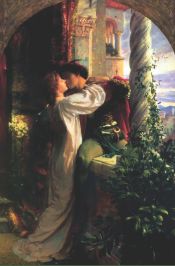
Bernstein Symphonic Dances from West Side Story Tchaikovsky Romeo and Juliet Overture We end our season with three very different works depicting Shakespeare’s Romeo and Juliet. Tchaikovsky’s sublime fantasy overture weaves the main themes of the story into twenty minutes of orchestral perfection. In West Side Story, Leonard Bernstein transplants the two doomed lovers to jazzy 1950’s New York. His Symphonic Dances leave the listener breathless as they are shamelessly bombarded with many of the twentieth century’s best tunes, including ‘Maria’, ‘America’ and ‘Cool.’ Berlioz was equally inspired, especially by his wife-to-be’s performance as Shakespeare’s Juliet. His ‘take’ on the work is bursting with harmonic imagination, fervent power, eloquent emotion and frustrated desire. Berlioz: Roméo et Juliette Bernstein: West Side Story Tchaikovsky: Romeo and Juliette | ||
Concert Saturday 22nd March 2014 at 19:45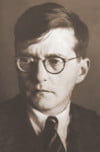 Shostakovich Symphony No. 6 Mussorgsky Pictures at an Exhibition Shostakovich’s 6th symphony, conceived in the 1930s, is a very personal work, reflecting not only the suffocating oppression of the Stalinist era but also the resilient spirit of the composer, with the power of the first movement balanced by the defiant and even riotous flair of the following two. Mussorgsky’s famous Pictures at an Exhibition was composed within a single month for piano, and has never slipped from orchestral repertoire since Ravel (among others) arranged it and it is Ravel’s orchestration we will be playing. Listen to the spooky ‘Catacombs’, enjoy the gossip from ‘The Market of Limoges’ and thrill to the grandeur of the final ‘Great Gate of Kiev.’ | ||
Concert Saturday 25th January 2014 at 19:45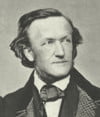
Wagner Die Walküre, Act 1 If you think you know Haydn, come and hear Symphony No. 103 (‘The Drumroll’), one of the famous late symphonies composed when Haydn was the toast of London. Symphony No. 103 is one of his most interesting, being packed with originality, pathos and wit. Following this, we are extraordinarily fortunate to be joined by internationally-known singers Janice Watson, John Upperton and Oliver Gibbs to perform Act 1 of Die Walküre, the second part of Wagner’s famous ‘Ring’ cycle. Controversially, some of us think that this is the most enjoyable way of playing Wagner. See what you think! 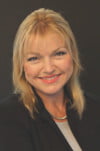 Janice Watson  John Upperton 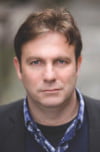 Oliver Gibbs | ||
Concert Saturday 16th November 2013 at 19:45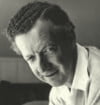
Britten Violin Concerto Wagner Die Meistersinger von Nürnberg, Act 3 Prelude Beethoven described his seventh symphony as ‘one of my best’, a view shared by audiences who demanded an encore of the second movement on its début performance. Wagner famously described it as ‘the apotheosis of the dance.’ Young Dutch virtuoso Mathieu van Bellen assists us to mark the centenary of the birth of Benjamin Britten with a performance of his violin concerto, which was inspired by Beethoven’s. Here economy of material is illuminated by virtuosic violin writing and scintillating use of orchestral tone colour. The brilliant overture to Die Meistersinger von Nürnberg delivers the complete opera in miniature; all the main themes are there. We add the atmospheric prelude to Act 3 to launch a season celebrating the 200th anniversary of Wagner’s birth. | ||
Concert Saturday 18th May 2013 at 19:45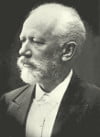 Piotr Tchaikovsky Khachaturian Violin concerto Tchaikovsky Symphony No. 6 (Pathétique) The final concert of our season opens with the brilliant Festive Overture, a vivacious musical firework. Khachaturian’s concerto is a magnificent whirlwind of powerful emotions and unbridled energy. The Pathétique is a complex mixture of emotions – sorrow, hope, and happiness tinged with a foreboding of despair – a mixture that has ensured its enduring popular appeal. | ||
Concert Saturday 16th March 2013 at 19:45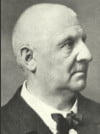 Anton Bruckner The Eighth Symphony is a monumental work, full of the composer’s characteristic ‘trade marks’ but taking them further than ever before: a mysterious opening, dramatic climaxes and contrasts, a lively dancing scherzo, a heartfelt slow movement – he believed it was his best one – and finally a very powerful finale which brings it all together in a glorious blaze of triumph. Allegro moderato Scherzo. Allegro moderato – Trio, langsam Adagio. Feierlich langsam, doch nicht schleppend Finale. Fierlich, nicht schnell | ||
Concert Saturday 26th January 2013 at 19:45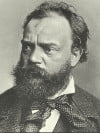 Antonin Dvořák Mahler Rückert Lieder Dvořák Symphony No. 7 Suk’s Fairy Tale is a colourful suite of four movements drawn from music he wrote for a theatre piece. Mahler’s set of five songs, based on poems by Friedrich Rückert, share a mood of intimacy and quiet withdrawal. The Seventh Symphony, dramatic and darkly passionate and expressing the defiance of the underdog, is perhaps Dvořák’s greatest. | ||
Concert Saturday 17th November 2012 at 7:45pmConcert dedicated to the memory of Malcolm Smith 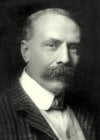 Sir Edward Elgar Elgar Cello concerto Vaughan Williams Symphony No. 2 (London) Bax’s best known work paints a vivid picture of the Cornish castle of Tintagel, battered by the Atlantic on a sunny day. Elgar’s wonderful concerto, contemplative and elegiac, has become a much loved cornerstone of the cello repertoire. The symphony depicts various London scenes, including the Westminster chimes, hansom cabs, street sellers’ cries, and the moods and tempos of our capital city. Bax: Tintagel (Note: Closed captions are available by clicking “CC”) Elgar – Cello Concerto Vaughan Williams | ||
Summer Workshop - Sunday 10th June 2012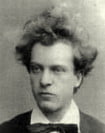 Hans Rott Our Summer Workshop is an occasion when the orchestra spends a day rehearsing an interesting work then gives an early evening informal performance which audiences may attend at no charge, although a collection is made to help cover our costs. The rehearsal is open to non-member players (who should apply beforehand) and spectators, including (silent) children. The work to be studied this year is the Symphony in E by Hans Rott, 11:00 – 12.00 Strings only rehearsal 12:00 – 13:00 Full orchestra rehearsal 13.00 – 14.00 Lunch (Please bring your own picnic lunch – weather permitting, lunch can be eaten outside) 14.00 – 15.30 Rehearsal 15.30 – 16.00 Break 16.00 – 17.30 Rehearsal 17.30 – 18:00 Break 18:00 – 18.15 Introductory talk to audience with possible extracts 18.15 – 19.15 Performance | ||
Concert Saturday 19th May 2012 at 7:45pm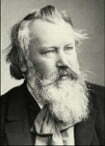 Johannes Brahms
Walton Two pieces from ‘Henry V’ Strauss Horn Concerto No. 2 Massenet Méditation from Thaïs Rossini’s overture is very well known, not least for its galloping finale which became the ‘Lone Ranger’ theme music. Music for strings from Walton’s ‘Henry V’ film music calms things down. Strauss’s love for the horn shines though all his orchestral works, and particularly in this late concerto which needs a real virtuoso soloist. We conclude our season with this wonderful symphony, which has been a mainstay of the orchestral repertoire ever since it was written. Rossini: Overture ‘William Tell’ Overture Walton: Two pieces from ‘Henry V’ Henry V Suite 2 – Passacaglia: The Death of Falstaff Henry V Suite 4 – Touch her soft lips and part Richard Strauss: Horn Concerto No. 2 Allegro Andante con moto Rondo (Allegro molto) Massenet: Méditation from Thaïs Méditation Bernard Brook tribute Brahms: Symphony No. 4 Allegro Non Troppo Andante Moderato Allegro Giocoso – Poco Meno Presto Allegro Energico e Passionato – Più Allegro | ||
Concert Saturday 17th March 2012 at 7:45pm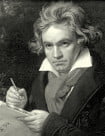 Ludwig van Beethoven
Beethoven Piano Concerto No 5 ‘The Emperor’ Borodin’s wonderful music is very widely known, much of it having been adapted for use in lighter and popular genres, notably in the musical ‘Kismet’. For Beethoven’s most well loved piano concerto, we are delighted to welcome back Masa, whose previous appearances with us met with such enormous acclaim. Bartók certainly puts the various sections of the orchestra through their paces in his showpiece concerto, a true 20th Century classic. | ||
Concert Saturday 21st January 2012 at 7:45pm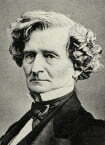 Hector Berlioz Arnold Clarinet Concerto No. 2 Berlioz ‘Symphonie Fantastique’ For 2012, the Queen’s Diamond Jubilee year, we open with Walton’s 1937 coronation march. The poignant ‘Sospiri’ (sighs) cools the mood, ready to be revived by Arnold’s jazzy concerto, originally written for Benny Goodman. In 1830 Berlioz took the musical world into new realms with his vivid picture of passionate but unrequited love that eventually turns into a wild nightmare. | ||
Saturday 12th November 2011 at 7:45pm
| ||
Saturday 21st May 2011 at 7:45pm | ||
Saturday 19th March 2011 at 7:45pm |


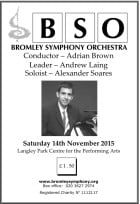
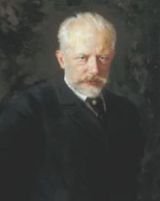
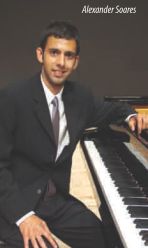 Schumann Overture from Manfred, Op. 115
Schumann Overture from Manfred, Op. 115 
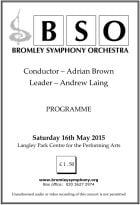
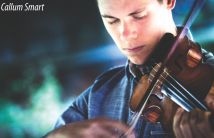
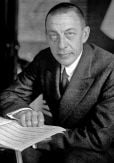 Humperdinck Prelude ‘Hänsel und Gretel’
Humperdinck Prelude ‘Hänsel und Gretel’ 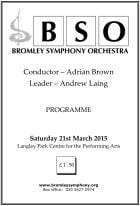
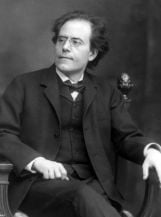
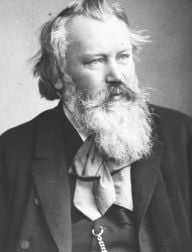
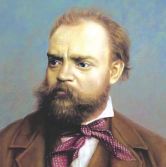
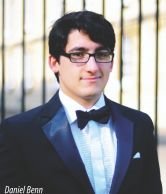
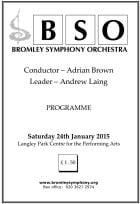
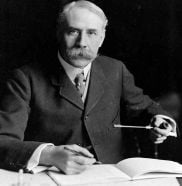
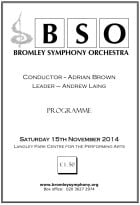
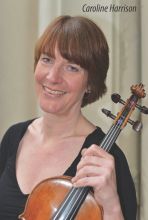 Walton Overture “Portsmouth Point”
Walton Overture “Portsmouth Point” 